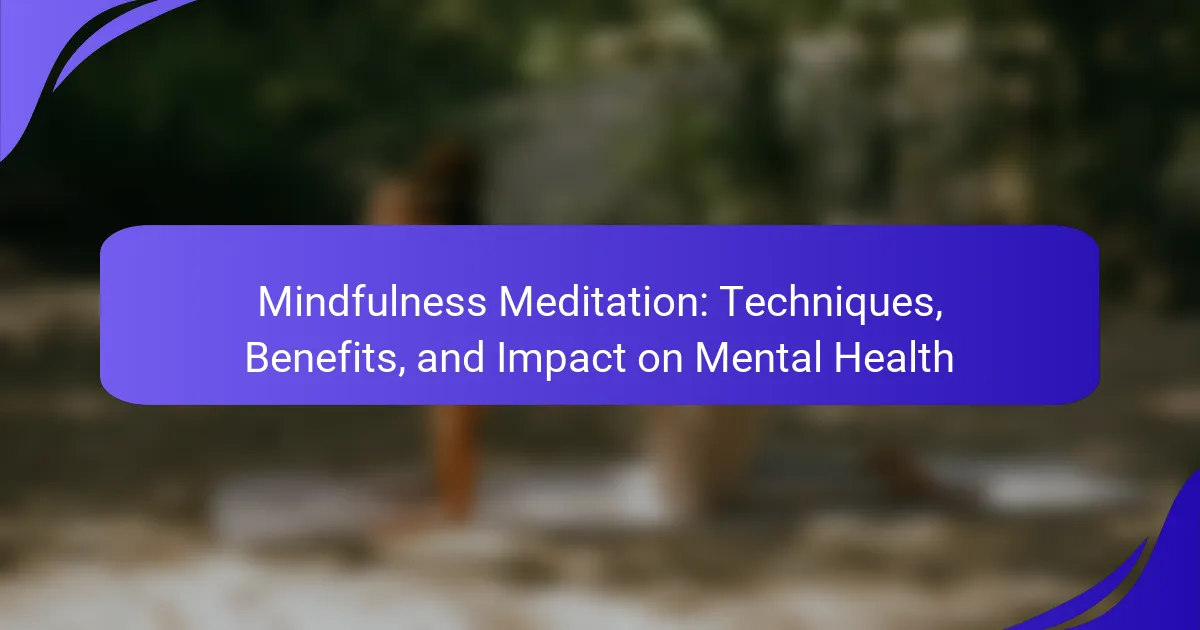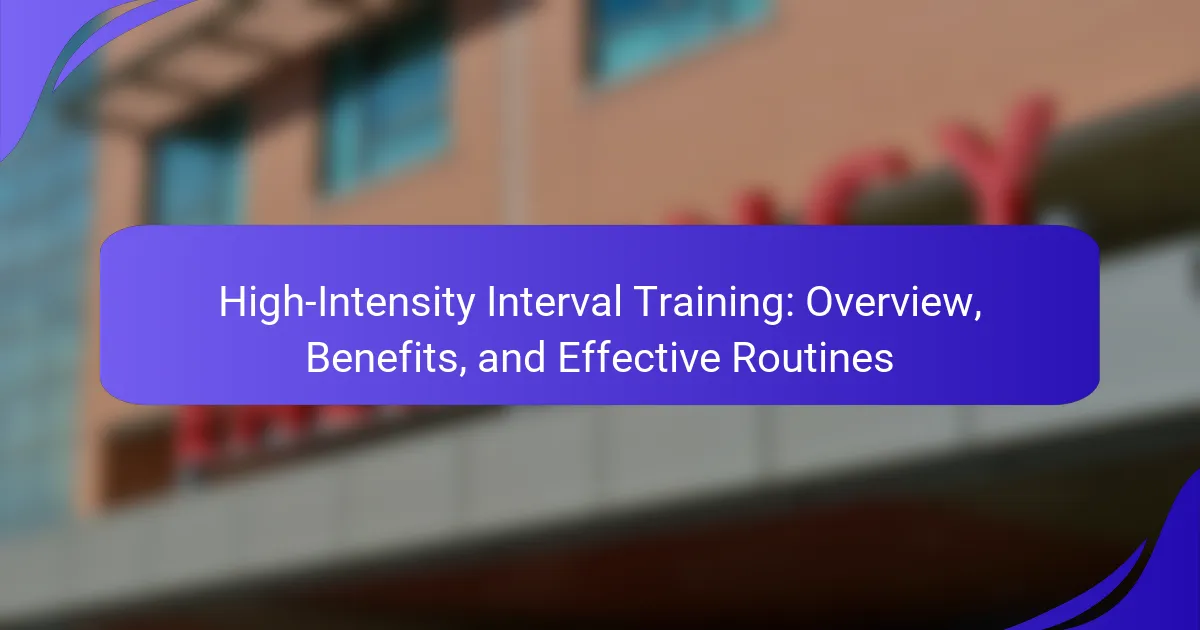Mindfulness meditation significantly enhances mental health by reducing stress and anxiety. This practice involves techniques like focused breathing and body scanning. It offers universal benefits such as improved emotional regulation and mental clarity. Additionally, mindfulness meditation presents unique challenges and best practices to optimize its effectiveness.
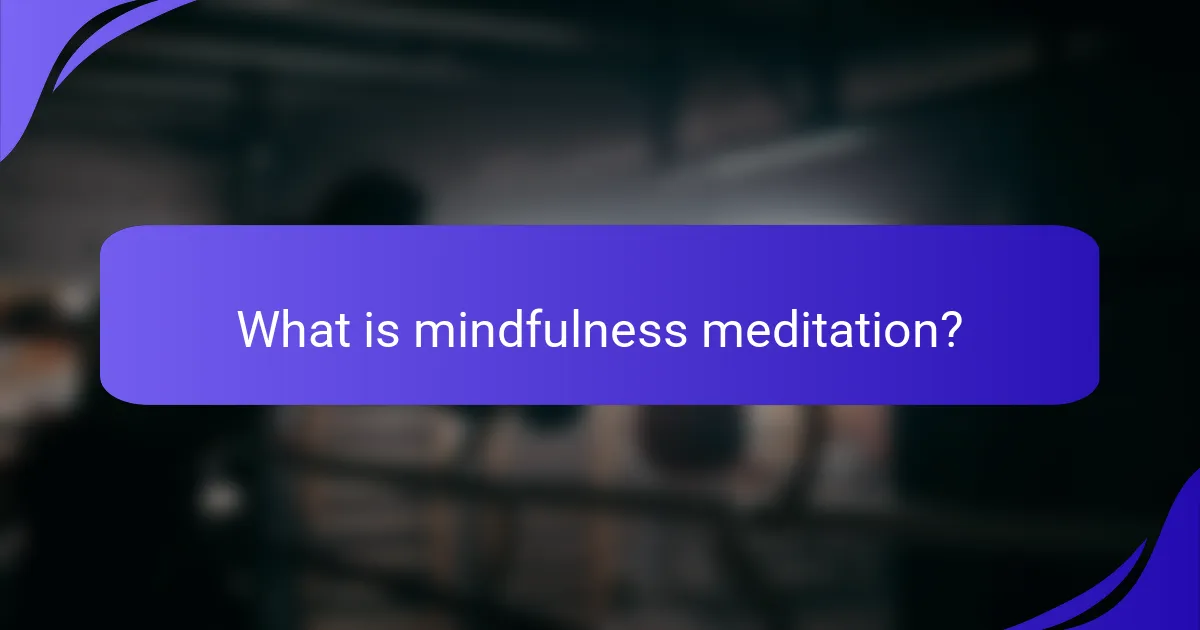
What is mindfulness meditation?
Mindfulness meditation is a practice focused on cultivating awareness and presence in the moment. It employs techniques such as breath observation, body scanning, and mindful movement to enhance mental clarity and emotional regulation. Research shows that mindfulness meditation reduces stress, anxiety, and depression, promoting overall mental well-being. Its unique attribute lies in its ability to foster a non-judgmental attitude towards thoughts and feelings, allowing practitioners to develop greater emotional resilience.
How does mindfulness meditation differ from other meditation practices?
Mindfulness meditation focuses on present-moment awareness, differing from other practices that may emphasize visualization or mantra repetition. This technique enhances emotional regulation and reduces stress, promoting mental clarity. Unlike transcendental meditation, which uses specific mantras, mindfulness encourages open observation of thoughts and feelings without judgment. This unique approach fosters a deeper connection to one’s mental state, yielding significant benefits for mental health.
What are the historical roots of mindfulness meditation?
Mindfulness meditation has roots in ancient Buddhist practices, particularly from the teachings of Siddhartha Gautama, known as the Buddha. This practice emphasizes awareness and presence, tracing back over 2,500 years. Historical texts reveal that mindfulness was integrated into various spiritual traditions, including Hinduism and Taoism. As a result, mindfulness meditation evolved, influencing modern therapeutic approaches to mental health. This unique adaptation highlights its effectiveness in reducing stress and improving emotional well-being.
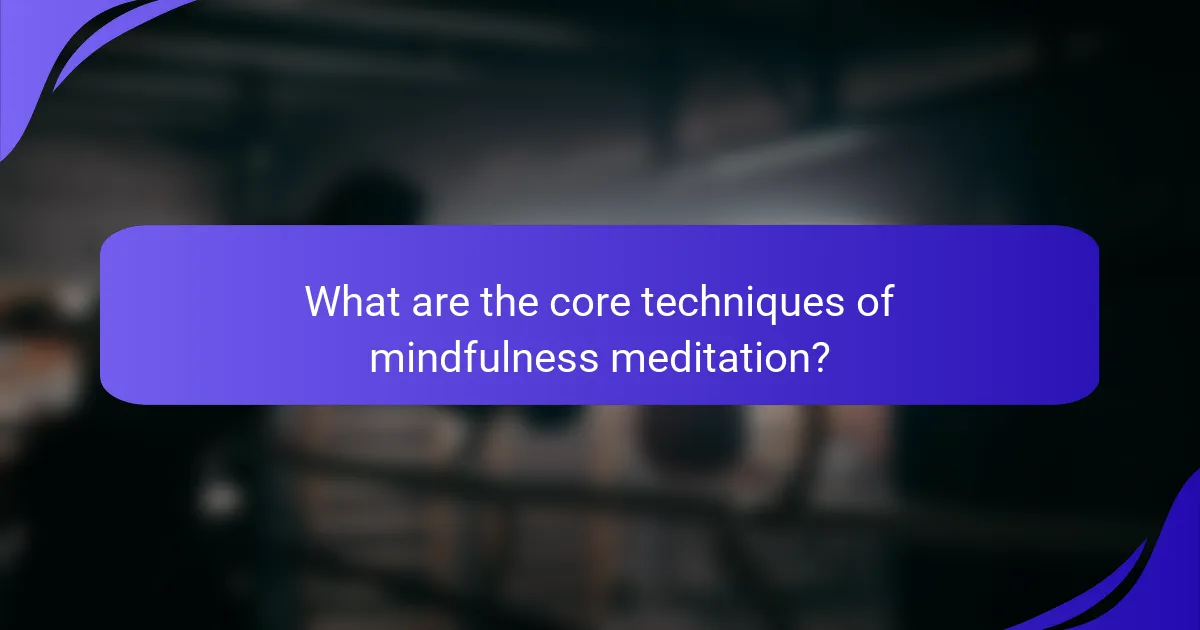
What are the core techniques of mindfulness meditation?
Mindfulness meditation employs techniques such as focused breathing, body scanning, and mindful observation. These methods enhance awareness and promote relaxation, impacting mental health positively. Focused breathing involves concentrating on each breath to anchor attention. Body scanning encourages awareness of physical sensations, fostering a connection between mind and body. Mindful observation emphasizes observing thoughts and feelings without judgment, cultivating acceptance and reducing stress.
How can breath awareness enhance mindfulness meditation?
Breath awareness significantly enhances mindfulness meditation by anchoring attention and promoting present-moment awareness. This technique fosters a deeper connection to one’s thoughts and feelings, reducing anxiety and stress. Research indicates that focusing on breath can improve emotional regulation and increase overall mental clarity. Regular practice can lead to lasting changes in brain function, promoting resilience and well-being.
What role does body scan play in mindfulness meditation?
Body scan plays a crucial role in mindfulness meditation by enhancing awareness of bodily sensations. This technique fosters a deeper connection between mind and body, promoting relaxation and reducing stress. By systematically focusing attention on different body parts, practitioners can identify tension and cultivate a sense of acceptance. As a result, body scan contributes significantly to the overall benefits of mindfulness meditation, such as improved mental clarity and emotional regulation.
How to practice mindful walking effectively?
To practice mindful walking effectively, focus on your breath and surroundings. Begin by setting an intention, then walk slowly, paying attention to each step. Notice sensations in your feet and legs, and observe the environment without judgment. This enhances awareness and reduces stress. Regular practice can improve mental clarity and emotional well-being.
What are the benefits of guided mindfulness meditation?
Guided mindfulness meditation offers numerous benefits, including reduced stress, improved focus, and enhanced emotional regulation. Participants often experience greater self-awareness and a sense of calm. Research indicates that consistent practice can lead to long-term improvements in mental health, such as decreased anxiety and depression levels. Additionally, guided sessions can be tailored to individual needs, making them accessible for beginners and experienced practitioners alike.
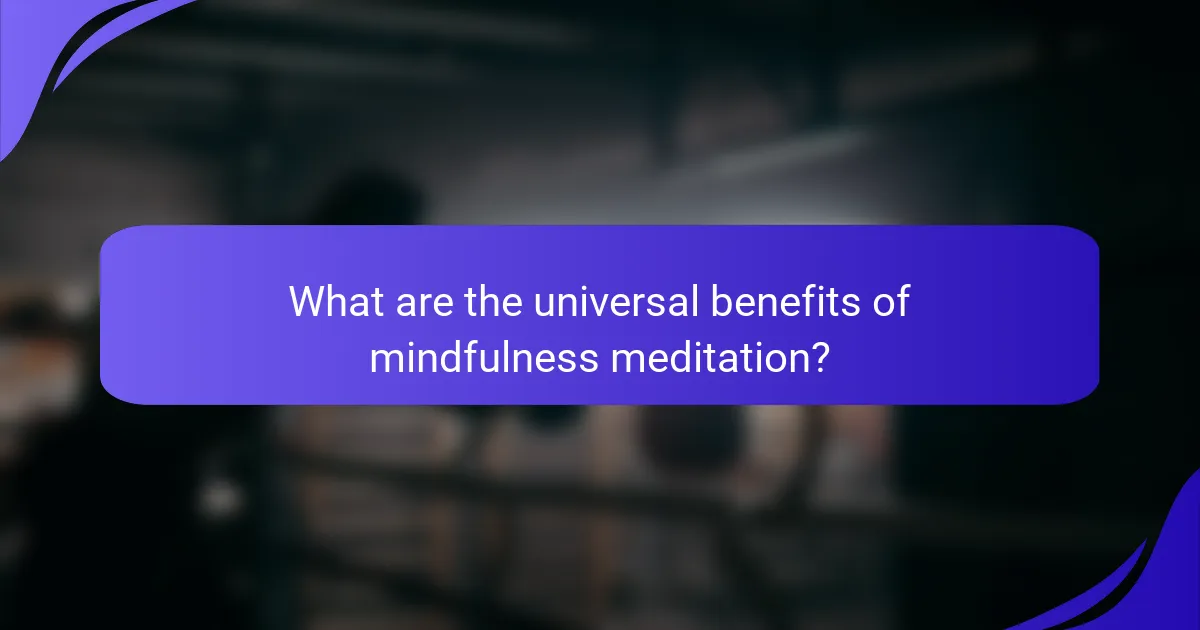
What are the universal benefits of mindfulness meditation?
Mindfulness meditation offers numerous universal benefits, including stress reduction, improved focus, and enhanced emotional regulation. These practices cultivate a state of awareness that promotes mental clarity and resilience. Research indicates that regular mindfulness meditation can decrease anxiety levels by up to 30%. Additionally, it fosters a greater sense of well-being and can improve relationships through better communication and empathy. The unique attribute of mindfulness meditation is its ability to create a non-judgmental awareness of thoughts and feelings, leading to profound personal insights and growth.
How does mindfulness meditation improve mental health?
Mindfulness meditation significantly enhances mental health by reducing stress, anxiety, and depression. It fosters emotional regulation and increases self-awareness, leading to improved overall well-being. Research indicates that regular practice can lower cortisol levels, contributing to a calmer mind. Additionally, mindfulness meditation has been linked to increased gray matter density in the brain, which is associated with better emotional regulation and cognitive function.
What impact does mindfulness meditation have on stress reduction?
Mindfulness meditation significantly reduces stress by promoting relaxation and enhancing emotional regulation. Research indicates that regular practice lowers cortisol levels, leading to decreased anxiety and improved mood. A study found that participants experienced a 30% reduction in stress after eight weeks of mindfulness training. This approach fosters a unique attribute of increased self-awareness, allowing individuals to respond to stressors more effectively. As a result, mindfulness meditation serves as a powerful tool for mental health improvement.
How can mindfulness meditation enhance emotional regulation?
Mindfulness meditation significantly enhances emotional regulation by promoting awareness and acceptance of emotions. This practice encourages individuals to observe their thoughts and feelings without judgment, leading to improved emotional responses. Research indicates that regular mindfulness meditation can reduce emotional reactivity, increase resilience, and foster a greater sense of well-being. As a result, practitioners often experience better management of stress and anxiety, contributing to overall mental health improvement.
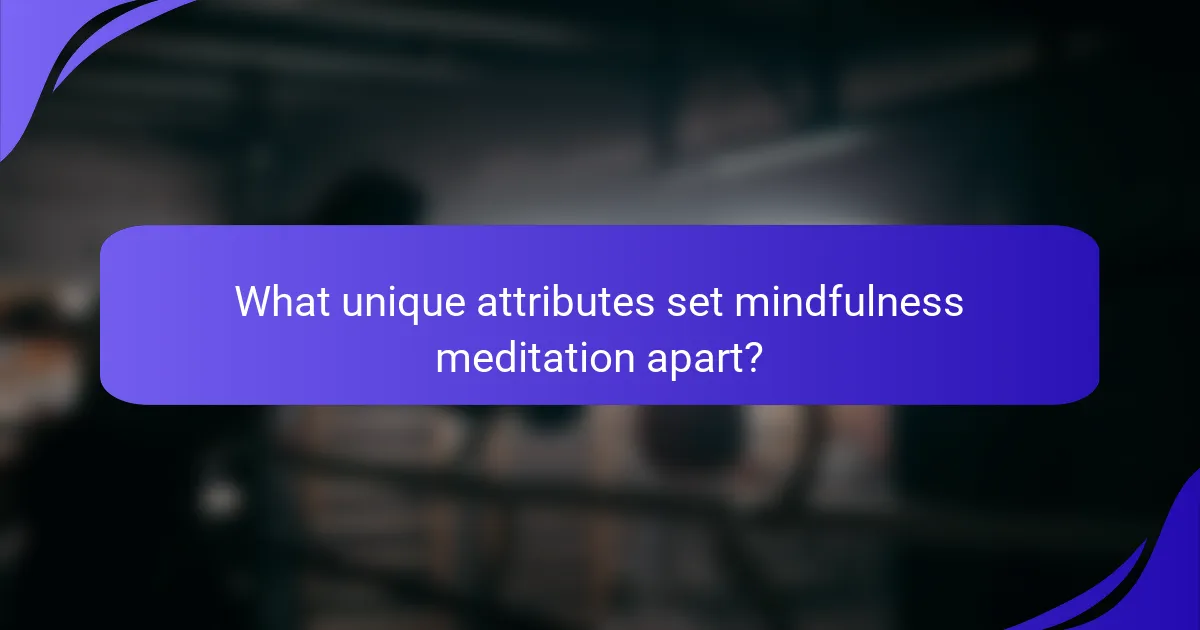
What unique attributes set mindfulness meditation apart?
Mindfulness meditation is unique due to its focus on present-moment awareness and non-judgmental observation of thoughts and feelings. This practice enhances emotional regulation, reduces stress, and fosters a deeper connection to oneself. Unlike other forms of meditation, it emphasizes acceptance rather than control, allowing practitioners to cultivate a compassionate mindset. Additionally, its accessibility makes it suitable for diverse populations, providing mental health benefits across various demographics.
How does mindfulness meditation influence neuroplasticity?
Mindfulness meditation enhances neuroplasticity by promoting brain changes that improve cognitive function and emotional regulation. Research indicates that regular practice strengthens neural connections, particularly in areas related to attention and self-awareness. This adaptability allows the brain to reorganize itself, forming new pathways in response to experiences. As a result, mindfulness can lead to long-term mental health benefits, such as reduced anxiety and improved resilience.
What unique experiences do practitioners report during mindfulness meditation?
Practitioners report diverse unique experiences during mindfulness meditation, including heightened awareness, emotional release, and a sense of interconnectedness. Many describe profound moments of clarity and insight, often leading to personal growth. Some individuals experience altered perceptions of time and space, while others encounter deep relaxation accompanied by physical sensations. These unique attributes contribute to the overall benefits of mindfulness meditation, enhancing mental health and emotional well-being.
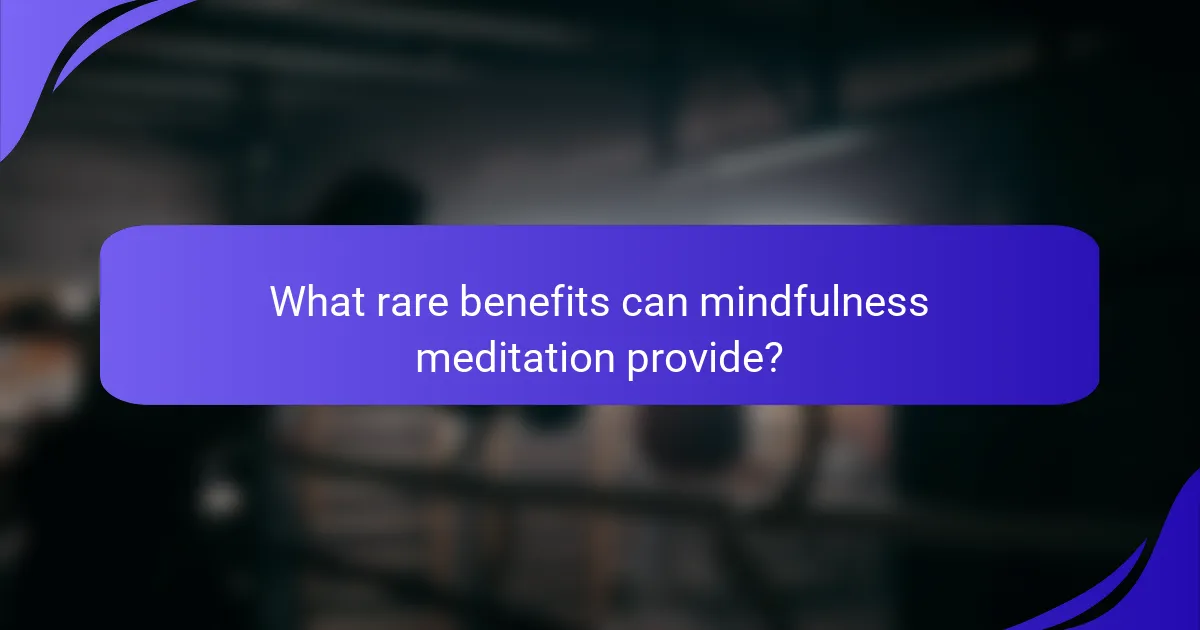
What rare benefits can mindfulness meditation provide?
Mindfulness meditation can provide rare benefits such as enhanced creativity and improved emotional regulation. These unique advantages stem from increased brain connectivity and neuroplasticity, which can lead to innovative thinking and better management of emotional responses. Research indicates that practitioners may experience a greater capacity for empathy and improved problem-solving skills, contributing to personal and professional growth.
How can mindfulness meditation aid in chronic pain management?
Mindfulness meditation can significantly aid in chronic pain management by promoting relaxation and reducing stress. It encourages individuals to focus on the present moment, which can shift attention away from pain sensations. Research indicates that mindfulness practices can decrease pain perception and improve coping strategies. A study found that participants using mindfulness meditation reported a 30% reduction in chronic pain symptoms over eight weeks. This approach not only addresses the physical aspect of pain but also enhances emotional well-being, fostering resilience and a positive mindset.
What unique insights have researchers discovered about mindfulness meditation?
Researchers have discovered that mindfulness meditation enhances emotional regulation and reduces anxiety. Unique insights indicate that consistent practice can lead to structural brain changes, particularly in areas related to self-awareness and stress response. Studies show participants experience improved focus and cognitive flexibility, revealing mindfulness as a tool for mental resilience. Additionally, rare findings suggest mindfulness can foster greater empathy and compassion, influencing interpersonal relationships positively.
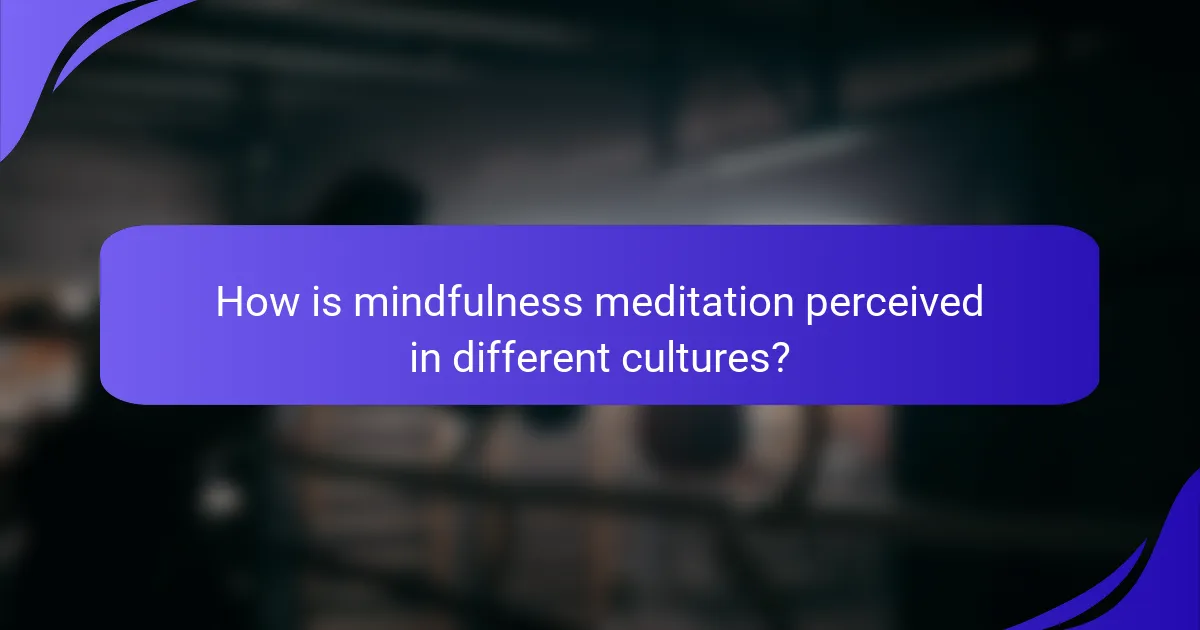
How is mindfulness meditation perceived in different cultures?
Mindfulness meditation is perceived differently across cultures, reflecting unique values and practices. In Eastern cultures, such as Buddhism, mindfulness is integral to spiritual development and enlightenment, emphasizing awareness and presence. Western cultures often view it as a therapeutic tool for stress reduction and mental health improvement, focusing on its psychological benefits.
In Japan, mindfulness is linked to Zen practices, promoting simplicity and harmony with nature. Conversely, in the United States, mindfulness has been popularized in corporate wellness programs, enhancing productivity and emotional resilience.
Cultural perceptions also influence techniques. For example, Tibetan practices incorporate visualization and compassion, while Western approaches may prioritize breath awareness and cognitive restructuring. These variations highlight the adaptability of mindfulness meditation to different cultural contexts, enriching its global appeal.
What regional practices influence mindfulness meditation techniques?
Regional practices significantly shape mindfulness meditation techniques, adapting them to cultural contexts. For instance, Zen Buddhism in Japan emphasizes seated meditation, while Tibetan traditions incorporate visualization and chanting. These unique attributes influence the overall experience and benefits of mindfulness. Additionally, community practices in various regions foster group meditation, enhancing social support and collective mindfulness. As a result, practitioners may find diverse techniques that resonate with their cultural backgrounds, enriching their meditation journey.
How do cultural attitudes shape the adoption of mindfulness meditation?
Cultural attitudes significantly influence the adoption of mindfulness meditation. Societies that prioritize mental well-being and holistic practices tend to embrace mindfulness more readily. For example, in cultures where meditation is integrated into daily life, such as in parts of Asia, individuals often experience greater acceptance and participation in mindfulness practices. Conversely, in cultures where mental health stigma exists, adoption may be slower. Education and awareness campaigns can shift perceptions, making mindfulness more accessible and appealing.
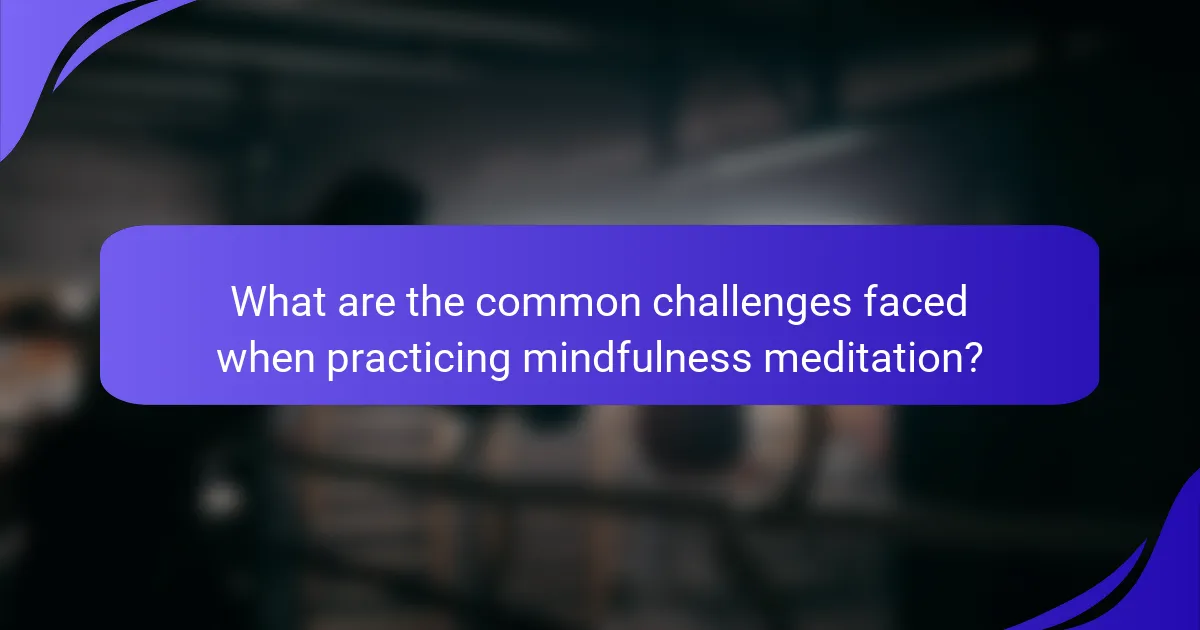
What are the common challenges faced when practicing mindfulness meditation?
Practicing mindfulness meditation often presents challenges such as difficulty maintaining focus, managing distractions, and coping with intrusive thoughts. These obstacles can hinder the overall effectiveness of the practice.
One common challenge is the struggle to quiet the mind, which can lead to frustration. Many practitioners find it hard to stay present, especially in a world filled with distractions. As a result, they may experience feelings of impatience or self-judgment.
Another challenge is the physical discomfort that can arise during meditation sessions. Sitting for extended periods can lead to tension or pain, which may divert attention from the meditation itself.
Lastly, some individuals may face emotional resistance, such as anxiety or restlessness, that surfaces during meditation. This emotional aspect can be particularly challenging, as it requires practitioners to confront and process their feelings rather than avoid them.
How can distractions affect mindfulness meditation practice?
Distractions can significantly hinder mindfulness meditation practice by disrupting focus and reducing the effectiveness of techniques. They can lead to wandering thoughts, which diminish the ability to remain present. This impact can result in decreased benefits such as stress reduction and improved mental clarity. Establishing a distraction-free environment enhances mindfulness, allowing practitioners to fully engage with their meditation.
What are the misconceptions about mindfulness meditation?
Many misconceptions surround mindfulness meditation, leading to confusion about its practice. A common myth is that mindfulness requires emptying the mind, while the focus is actually on observing thoughts without judgment. Another misconception is that mindfulness is solely about relaxation; it also enhances awareness and emotional regulation. Some believe mindfulness is a quick fix for mental health issues, but it is a skill that develops over time with consistent practice. Additionally, people often think mindfulness is a religious practice, whereas it can be secular and adapted to various personal beliefs.
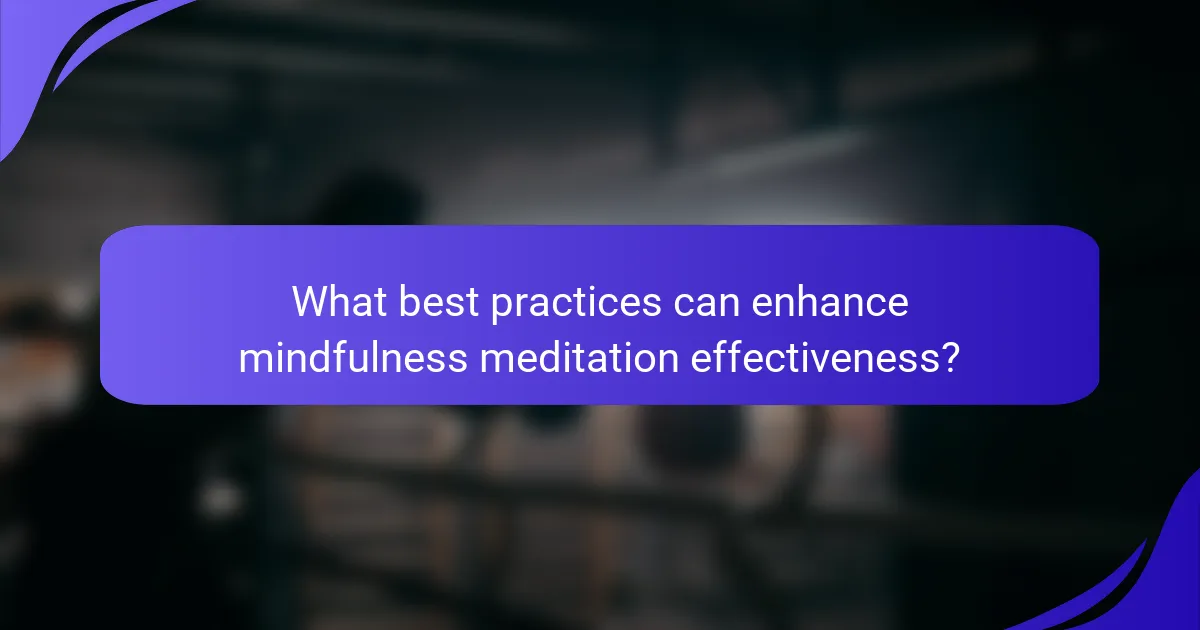
What best practices can enhance mindfulness meditation effectiveness?
Practicing mindfulness meditation effectively involves several best practices. First, establish a consistent schedule to create a routine. Second, focus on your breath to anchor your attention and reduce distractions. Third, create a dedicated space for meditation to enhance concentration. Fourth, start with shorter sessions and gradually increase the duration to build endurance. Finally, incorporate mindfulness into daily activities to reinforce the practice. These techniques can significantly improve the impact of mindfulness meditation on mental health.
How to create an ideal environment for mindfulness meditation?
Creating an ideal environment for mindfulness meditation involves minimizing distractions and fostering a sense of calm. Choose a quiet space, free from interruptions, and ensure comfortable seating. Dim lighting or natural light can enhance relaxation. Incorporate soothing elements like soft music, candles, or essential oils to promote tranquility. Personalize the space with items that inspire peace, such as plants or meaningful objects.
What are the key tips for maintaining a consistent mindfulness meditation practice?
To maintain a consistent mindfulness meditation practice, establish a regular schedule, create a dedicated space, and start with short sessions. Gradually increase the duration as you become more comfortable. Use guided meditations to enhance focus and incorporate mindfulness into daily activities. Track your progress to stay motivated.
What common mistakes should be avoided during mindfulness meditation?
Common mistakes during mindfulness meditation include distractions, unrealistic expectations, and improper posture. Distractions can hinder focus, while unrealistic expectations can lead to frustration. Maintaining proper posture is essential for comfort and effectiveness. Avoiding these pitfalls enhances the overall benefits of mindfulness meditation.
How can mindfulness meditation be integrated into daily life?
Mindfulness meditation can be integrated into daily life through simple practices. Start with five minutes of focused breathing each morning. Incorporate mindfulness during routine activities, such as eating or walking, by paying attention to sensations and thoughts. Utilize guided meditation apps for structure and support. Set reminders to practice mindfulness throughout the day, fostering a habit. As a result, these techniques enhance mental clarity and reduce stress, contributing to overall well-being.
